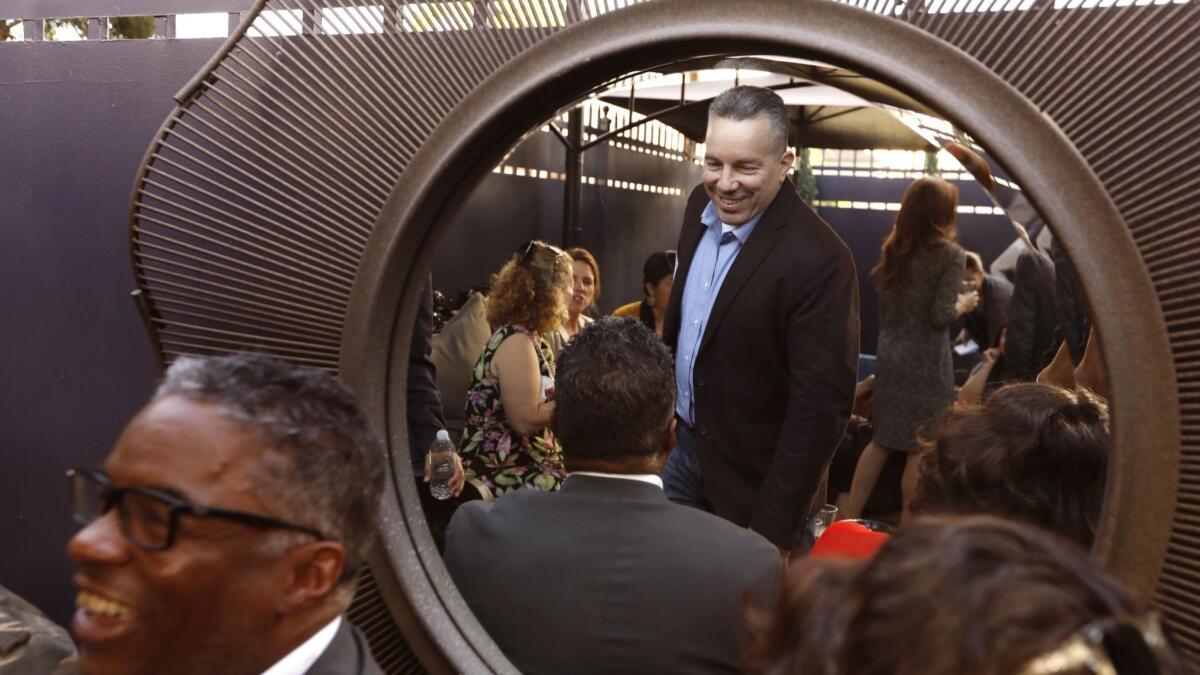A historic election shock gives a longshot the chance to topple L.A. County Sheriff Jim McDonnell

Few, if anyone, expected Alex Villanueva to make Los Angeles County election history.
The part-owner of a CrossFit gym was taking on Sheriff Jim McDonnell, one of the area’s most powerful local law enforcement figures who was elected four years ago by a landslide.
Villanueva had no professional campaign consultant, virtually no money and little name recognition.
But the retired sheriff’s lieutenant accomplished what political observers thought was nearly impossible: He forced the incumbent sheriff into a runoff, an event that’s happened only four times in the last century.
His strong performance in the June primary means this year’s sheriff’s election — usually a reappointment of the person already in charge or a coronation of a chosen successor — will be a real race, political experts said.
“If I were part of the McDonnell campaign, it would certainly concern me,” said Jessica Levinson, a Loyola Law School professor who teaches election law. “Anytime you have spent multiples more [than an opponent] and then you end up in a runoff, it’s cause for pause and soul searching and concern.”
McDonnell, who outspent Villanueva 16 to 1, scored 48% of the vote, a few points shy of the simple majority he needed to avoid a runoff in November. Villanueva finished second with 33%. The third candidate, retired Sheriff’s Cmdr. Bob Lindsey, won 19%, according to certified election results.
The son of a Puerto Rican father and a Polish American mother, Villanueva did well in heavily Latino areas like Southeast Los Angeles, the San Fernando Valley and Pomona, according to a Times analysis of votes by precinct. A registered Democrat, he was also endorsed by the Los Angeles County Democratic Party, earning him a spot on the organization’s slate of recommendations to voters in the deep-blue county.
“We crossed a barrier where the incumbent was ‘untouchable’ and found, no, he’s actually vulnerable,” said Villanueva, 55, of La Habra Heights.
His second place in the primary means he will spend the next few months stumping full time against an opponent who already has a busy job. Neither finds pleasure in campaigning. Villanueva says his packed schedule is onerous and he misses eating home-cooked meals. McDonnell, 58, said raising money “is not something I enjoy or relish in any way.”
McDonnell said he was disappointed by the results but looks at the campaign ahead as “an opportunity to get our message out.”
In 2014, his call for sweeping reforms in a Sheriff’s Department plagued by a scandal over abuse of jail inmates helped him become the first outsider to win election as sheriff in a century.
A former Long Beach police chief who spent most of his career at the Los Angeles Police Department, McDonnell describes himself as a “progressive police leader” and has endorsements from Los Angeles Mayor Eric Garcetti, Dist. Atty. Jackie Lacey, L.A. County Supervisor Hilda Solis, the California Peace Officers Assn., and others. He’s been a registered Republican in the past but says he is no longer affiliated with a political party.
Whatever Villanueva’s potential strengths in appealing to Latinos and Democrats, McDonnell still has plenty of advantages, political experts said. Voters probably sense that crime is relatively low compared to decades past, a perception that helps the incumbent, said Bill Carrick, an L.A.-based political strategist and media consultant.
While crime has risen overall in areas patrolled by the Sheriff’s Department during McDonnell’s term, it has been decreasing for more than a year.
All voters in L.A. County are eligible to vote for sheriff, regardless of whether the Sheriff’s Department patrols their community. The enormous task of campaigning in an area with 10 million residents, 88 cities and myriad community issues makes it difficult to take on any countywide officeholder, Carrick said.
Fernando Guerra, a political science professor at Loyola Marymount University, said he was stunned at the primary election result, in part because Villanueva raised only $27,000 compared with McDonnell’s haul of $586,000. Villanueva, Guerra said, will likely need to spend more money than McDonnell to communicate with enough voters and have a shot at winning in November.
McDonnell shouldn’t underestimate his challenger, Guerra said. Latinos and other voters of color, he said, are expected to turn out in bigger numbers in the fall, when candidates for governor and U.S. senator are also on the ballot, a factor that could help Villanueva.

“Had Jim McDonnell called me in February or so, I would have said, ‘What are you worried about? Look at who’s running against you. Relax,’” Guerra said. “I would have been completely wrong.”
The most likely threat to McDonnell had appeared to come from Lindsey, a retired sheriff’s commander who raised $330,000 and was supported by $410,000 in additional funds from an independent expenditure committee. He won some precincts, but none by a commanding lead, according to voter data.
Both he and Villanueva complained that deputy morale is dangerously low under McDonnell and accused the sheriff of mismanaging the department. Villanueva said he expects Lindsey will join his campaign. Lindsey did not return calls for comment.
Villanueva says he can beat McDonnell on Nov. 6 by appealing to progressives and touting his knowledge of the department and how it should be reorganized. He retired in February after serving on the department for three decades, including years as a street cop in East Los Angeles and more recently, Pico Rivera.
The largest group he’s managed directly has been 80 to 100 people at the women’s jail during shifts as a watch commander, he said.
McDonnell, who reached the lieutenant rank 25 years ago, said his opponent doesn’t have the experience to manage “one of the most complex policing organizations in America.”
“This is not a place where you can expect to learn on the job and have it not be detrimental to public safety. That’s not fair to the public we serve,” McDonnell said.
Villanueva said the race isn’t about management experience, but about being able to lead and inspire people.
His campaign began last year with little indication that he had much grass-roots support. He announced his candidacy in front of a handful of supporters at an East L.A. park where the only crowd he drew was a flock of ducks.

As he steps up his campaign, Villanueva recently mingled at a social event for East Los Angeles business owners where he shook hands, spoke Spanish and told several people to check out his website. He kept a low profile and left without taking the stage to address the nearly 100 people in the audience, later explaining that the event’s organizers didn’t want him to make a political speech.
“I like the fact that he’s bilingual and he looks like he can relate to the Spanish-speaking community,” Caroline Sandoval, the owner of a Boyle Heights-based housekeeping service, said at the gathering.
Villanueva says his platform is resonating. He’s staked out an array of positions, not all of which are quintessentially progressive.
They include a proposal to streamline use-of-force guidelines so that supervisors don’t have to write so many reports, a move Villanueva says is a forward-thinking effort to focus on policing rather than paperwork.
He also says he wants to ensure that deputies have a long-term presence in the communities they serve and that he would increase transparency. But he criticized McDonnell’s effort to give prosecutors the “Brady List,” a confidential roster of deputies with histories of misconduct.
A deputies’ union went to court last year to block McDonnell from disclosing the list to the district attorney’s office. The matter is now before the California Supreme Court. Villanueva described McDonnell’s attempt to give the list to prosecutors as “a call of desperation” in order to be viewed as a reformer at a time when the sheriff has also promoted some officials with histories of serious discipline to high ranks.
Villanueva also says he would make sure U.S. Immigration and Customs Enforcement agents have no access inside the county jail system, the nation’s largest, which is overseen by the sheriff.
Whether people arrested by local police are being handed over to immigration authorities has been one of the main concerns voiced by immigrants’ rights advocates amid President Trump’s push for mass deportations. California’s “sanctuary state” law prohibits local jails from providing “exclusively dedicated” office space to immigration authorities.
The Sheriff’s Department allows ICE agents to use an office reserved for various outside agencies in the Inmate Reception Center in downtown Los Angeles, McDonnell said.
“The alternative is they stand in the lobby, which has a chilling effect on people,” McDonnell said.
In recent years, the department said in public statements that ICE had no access to inmate information in the county jail system, other than what was available on a public website.
A report by the Sheriff’s Inspector General in October found the Sheriff’s Department had, in fact, given office space to ICE agents with computers that provided “a constant flow of information regarding prisoners who were soon to be released.”
In response, McDonnell acknowledged the claims his staff had been making were inaccurate and the department removed the computers used by the ICE officials.
He reiterated that his deputies are prohibited from asking people about their immigration status and said his officers do not participate in immigration raids.
McDonnell has said he rejects the idea that his deputies should become more lenient in documenting their uses of force. Before becoming sheriff, McDonnell served on a county commission that criticized “a persistent pattern of unnecessary and excessive use of force” within the department-run jails.
Far from proposing sweeping policy changes, McDonnell said he wants to better engage with communities in order to reduce crime and enhance partnerships with social services organizations to combat homelessness and mental illness.
He said he wants to hire more deputies and continue to improve the jails, where severe force by deputies has dropped during his term.
“I’m gonna focus a serious effort on the race,” McDonnell said. “I don’t take anything for granted.”
Times data journalist Anthony Pesce contributed to this report.
Twitter: @mayalau
More to Read
Sign up for Essential California
The most important California stories and recommendations in your inbox every morning.
You may occasionally receive promotional content from the Los Angeles Times.











